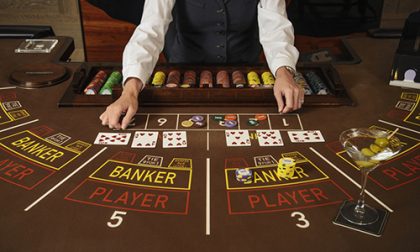Baccarat Dealer Pleads Guilty to Involvement in Cheating Scheme
You may have heard a little something about Phil Ivey cheating in a baccarat game. Now, I am on the record as saying I don’t believe his edge-sorting gambit was exactly cheating, but I can certainly understand why people would have the opposite opinion. But I’m not here to talk about Phil Ivey again – there is a much more cut-and-dry incident of baccarat cheating that happened and the dealer (yes, dealer) who was the main perpetrator pleaded guilty this week in federal court.

MGM National Harbor
Photo credit: mgmresorts.com
First reported by Washington D.C.’s NBC4, Ming Zhang, a baccarat dealer at MGM National Harbor Casino in Maryland, conspired with at least one player a year ago to bilk the casino out of $1,046,560.
The scheme sounds like it was quite simple and, frankly, I find it amazing that Zhang and friends weren’t caught immediately. According to court filings, Zhang showed part of the deck to his co-conspirator, who then took a picture of it. Zhang returned the cards to the deck, but did not shuffle them. Presumably, his player accomplice and possibly others then referred to the photo so that they would know what cards were coming and could increase their bets accordingly.
The indictment stated the obvious, “If a bettor knows the order in which cards appear in the deck, the bettor can predict the outcome of any given baccarat hand with near-perfect accuracy and place bets accordingly,” the indictment said.
To further explain how insanely large of an advantage someone would have if they knew what cards were on the way, let’s briefly look at how baccarat works.*
The game is played between the “player” and the “dealer,” though the gambler is not really competing against the dealer like in blackjack. The “player” and “dealer” are literally just designations for two different hands. The gambler can bet that either the player or dealer wins or he can bet on a tie.
Two cards are dealt face up to the player and the dealer. Twos through nines are worth face value, tens through kings are worth zero, and aces are worth one. The cards are added up and the ones-digit of the sum is used as the score (ex: a three and four gives the value of seven, while eight plus nine also equals seven).
If either or both the player and banker are dealt a total of eight or nine right off the bat, the game ends and winning bets are paid out. If not, there is a set of rules to determine if the player and/or banker draw a third card. Once all that is done, the game is over and whichever side has the highest total wins.
Because of the simple math of the game and the fact that the number of cards that can be dealt is very limited, it should be obvious why knowing which cards are coming would provide not just an advantage, but a spectacular advantage. I mean, if you know what the totals will be, you can bet perfectly.
Zhang enacted his plan on September 27, 2017; he allegedly called the player accomplice to set things up ahead of time. They were to split the winnings. Court filings also stated that Zhang was at least “present” when a co-conspirator enacted the same scheme at a different Maryland casino. The two met at a hotel nearby and Zhang was paid $1,000. He later contacted a co-conspirator to ask for more money. The next day, investigators approached Zhang about the situation, but he denied any involvement.
On Tuesday, Zhang pleaded guilty to one count of conspiring to transport stolen funds. He faces up to five years in prison. Nobody else has been charged. Zhang’s sentencing hearing is scheduled for January 31st.
*Though I work in the gaming industry, baccarat wasn’t a game I knew much about until educating myself on Ivey’s edge-sorting scandal. Funnily enough, my knowledge about the game used to be limited to an “Alvin and the Chipmunks” episode I watched when I was a kid in which Miss Miller wins big in her home poker game against the Chipettes because they rigged it in her favor. She goes to Vegas, thinking she’s hot shit and wins at first, but then starts losing big at blackjack. She is invited to play in a private baccarat game with some mysterious rich dude and proceeds to quite literally lose her house to him. It turned out the Chipmunks were performing at the casino and it was Dave Seville as the rich guy in disguise. They had setup the game so Miss Miller would lose her money to Dave, who later returned it all to her when she got back home.



















COMMENTS